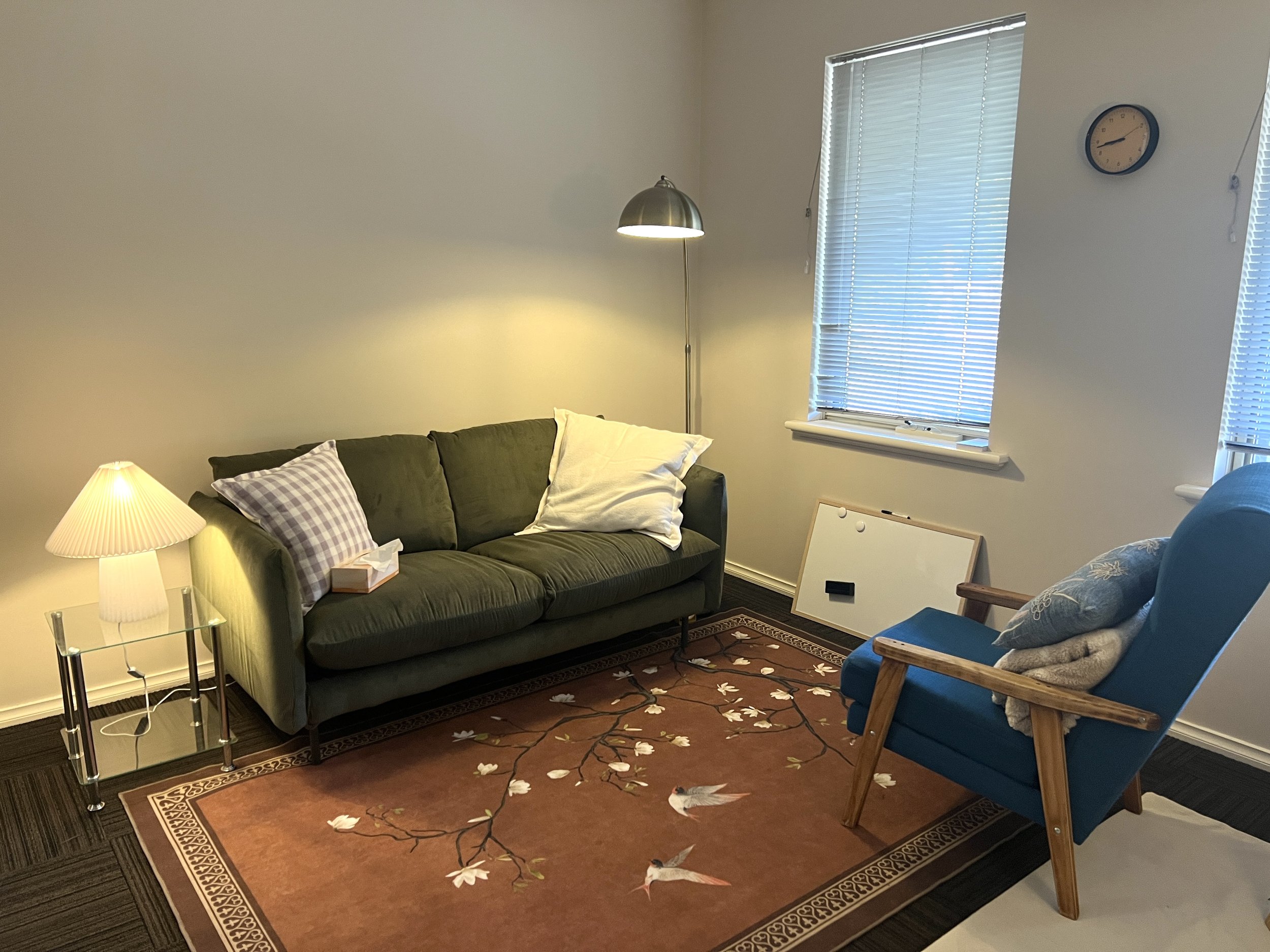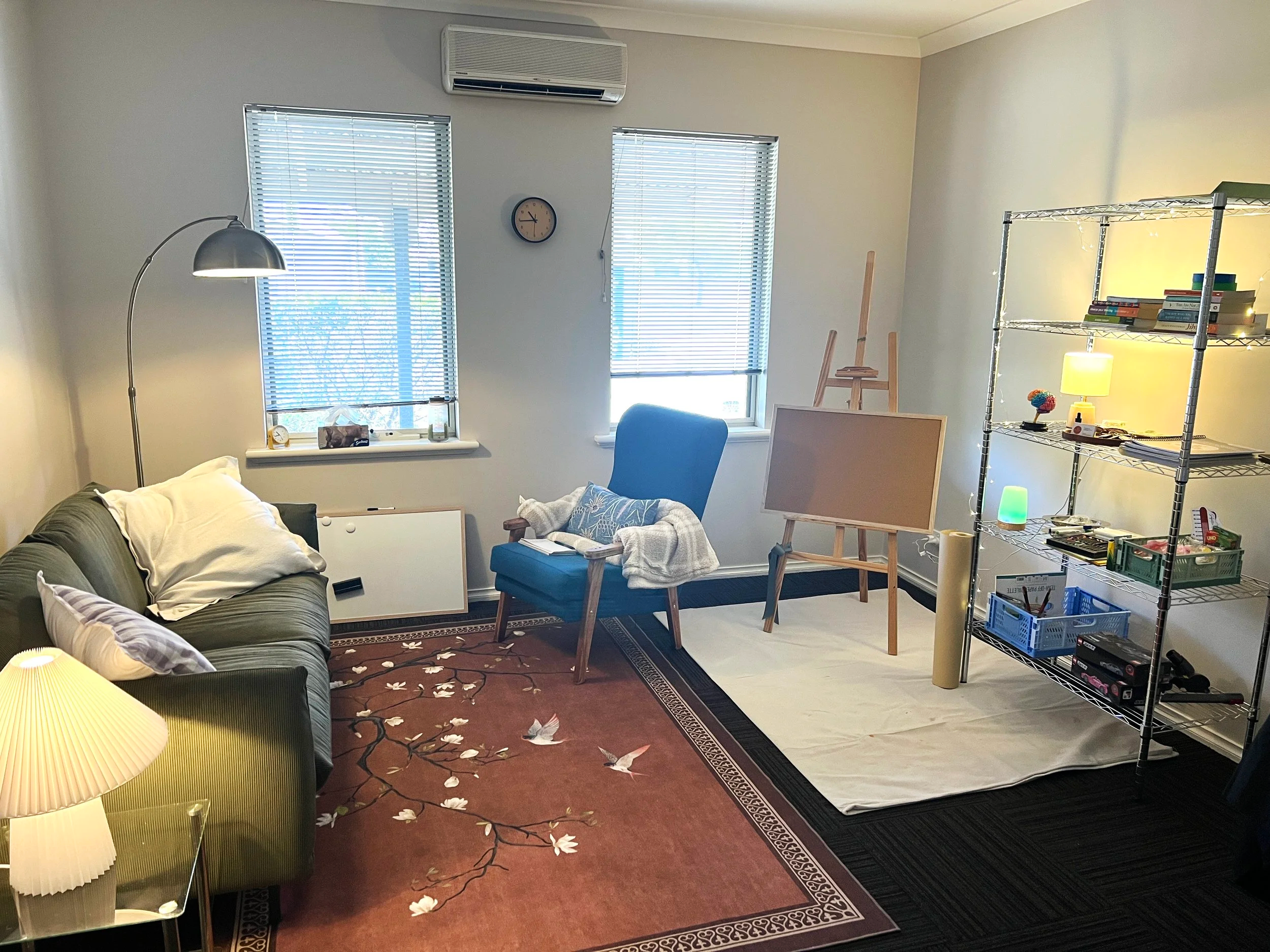
Hi, I’m Tash
I’m an Accredited Mental Health Social Worker based in the regional mining town of Kalgoorlie, WA. I work with children, adults and families who feel overwhelmed, stuck, or struggling with their mental health. My approach is down-to-earth and practical, helping you make sense of what’s going on and move forward in a way that feels right.
In-person
.
Telehealth
.
Mobile outreach
.
Kalgoorlie, WA
.
The Goldfields
.
In-person . Telehealth . Mobile outreach . Kalgoorlie, WA . The Goldfields .
About Me
I’m originally from Sydney and moved to Kalgoorlie in 2023. I love the slower pace, the simplicity and the strong sense of community here. It’s a place I want to give back to.
I completed a Master of Social Work at the University of Sydney and have worked across mental health, domestic violence and hospital settings. My work is grounded in evidence-based practice, drawing on cognitive behaviour therapy, dialectical behaviour therapy, schema therapy and EMDR. I have a particular interest in attachment trauma and how early experiences shape how we think, feel and relate to others.
My work is also shaped by lived experience. I grew up around childhood trauma, domestic violence and addiction, and I’ve done my own therapeutic work to understand how these experiences continue to show up across adulthood. Therapy has been a significant and meaningful part of my own life, and I’ve experienced firsthand how powerful it can be to feel understood, supported and less alone. It’s shaped the values and principles that underpin my own practice: compassion, honesty, and deep respect for how hard change can be. Not everyone needs therapy, and therapy is not for everyone, but it can be profoundly impactful and meaningful for those who choose it.
The Therapy Space
The therapy space is intentionally designed to feel welcoming, comfortable and human. Natural light fills the space during the day, and warm lamps offer softer lighting for anyone who finds overhead lights a bit too much. Colour is woven throughout — for kids, who often express and regulate through play and creativity, and for adults who want something that feels less clinical and more calming.
I’m located at Suite 2, 171 Piccadilly Street, Kalgoorlie WA 6430, inside the Kalgoorlie-Boulder Business Development Centre. There is plenty of on-site parking and a comfortable reception area.
My Services
-
Paediatric Counselling
I offer counselling for children aged 8+ using play-based and developmentally appropriate approaches to help children make sense of their emotions, experiences, and relationships. Family/carer involvement is also a core part of my practice.
Common themes explored in therapy include emotion regulation, behaviour concerns, conflict resolution, attachment and bonding, and early intervention support for emerging mental health concerns including anxiety and depression.
-
Adult Counselling
I offer counselling for adults seeking support with emotional wellbeing, life transitions, and ongoing mental health concerns. I aim to help clients build insight, emotional capacity, and practical tools, while fostering self-compassion and a stronger sense of agency in their lives.
Common themes explored in therapy include anxiety, depression, stress and burnout, self-esteem, relationship difficulties, trauma (including sexual trauma), suicidal thoughts, and addiction.
-
Supervision
I offer professional supervision for social work graduates and early career clinicians working in mental health settings. Supervision offers a supportive and reflective space to think through clinical work, develop confidence, and strengthen professional identity.
Topics explored in supervision include clinical reasoning, ethical practice, boundaries, and self-care. I aim to support clinicians to feel more grounded in their decision-making while navigating the complexity and emotional demands of mental health work.

The Red Earth Blog
I’m excited to share the new blog from Red Earth Counselling. It’s a space for reflections, resources, and myth-busting about therapy and mental health. Whether you’re curious about starting therapy or simply looking for grounded insights, you’ll find something here.
Some questions you might have
-
An Accredited Mental Health Social Worker (AMHSW) is a social worker and allied health professional with a minimum of two years post-qualifying experience and specialist training in mental health. We’re assessed by the Australian Association of Social Workers (AASW) and must undertake a minimum of 30 hours of professional development each year in order to remain credentialed. AMHSWs are recognised by Medicare to provide focused psychological support using evidence-based therapies, and are also trained to identify and address social and environmental factors that affect mental health and wellbeing.
-
Please see the full schedule of fees here.
-
No. You can refer to me directly by completing this referral form.
If you’re unsure, you’re welcome to get in touch using the contact form below, and I will reach out to arrange an initial 15-minute chat so you can ask questions and see if you feel comfortable working together.
-
A referral and Mental Health Treatment Plan will significantly reduce the out-of-pocket cost of sessions. To get a MHTP and referral:
Book an appointment with your GP, face-to-face or telehealth are both fine. (You can also get a Mental Health Treatment Plan from your psychiatrist or paediatrician if you have one.)
At the appointment, ask for a MHTP and referral for counselling.
The GP will ask you a few questions about your mental health and most likely will give you a short questionnaire to complete. The most common ones are the K10 (Kessler-10) or DASS-21 (Depression, Anxiety and Stress Scale), which are tools used to measure the level of psychological distress. The GP may also give you a provisional or formal diagnosis. This information is included in the MHTP.
You may ask the GP to refer specifically to me for counselling support. The referral can then be addressed to:
Natasha Hau
Red Earth Counselling
0456 668 649
tash@redearthcounselling.com.auEmail the MHTP and referral letter to me at tash@redearthcounselling.com.au
The Mental Health Treatment Plan and referral entitles you to claim Medicare rebates for up to 10 sessions per calendar year. The initial referral will be for 6 sessions, and a GP review is required for further sessions. If approved, an additional 4 sessions may be granted, totalling 10 sessions per calendar year.
Referrals addressed to another clinician are also valid — you don’t need to revisit the GP to get the addressee changed.
-
The first session is really about getting the full picture rather than jumping straight into intervention. I’ll ask about what’s brought you in, but also about you as a whole person — your values, experiences, and what’s been helpful (or unhelpful) in the past. If you’ve worked with other counsellors, we’ll talk about what worked and what didn’t. And if you’re new to this, that’s totally okay, we’ll figure it out together.
After our first meeting, I take some time to pull together what you’ve shared and make sense of the bigger picture. From there, I can suggest some treatment options, and we’ll decide together on a plan that feels realistic and supportive.
-
If, at some point during our work together, you tell me you have suicidal thoughts, I won’t automatically panic or send you to hospital, but I will want to talk with you about them. Many people experience suicidal thoughts without any intention to act on them, and therapy can be a safe place to talk about them openly. My approach to talking about suicide is generally frank but also serious. We can work together to understand them, manage them and reduce their impact.
Hospitalisation only becomes necessary if you are in immediate danger. For example, if you have serious (or even some) intent, a specific plan and/or accessible means, and you are unable to keep yourself safe, then yes, hospitalisation would be necessary. In that case, I will support you in accessing the care you need, including preparing you for what the process might be like. I have also listed some support services on my page for those in crisis now.
Going to hospital doesn’t always mean being restrained or admitted to a psychiatric ward. Sometimes it involves an assessment, short-term observation, or connecting you to more intensive community supports. My aim is to handle these situations with transparency, respect and compassion.
Get in touch
Make a referral
I’m currently accepting new referrals. If you would like to go ahead and book your first appointment, please first complete this referral form.
Make an enquiry
It may feel a little overwhelming when you first reach out for support. Many people feel uncertain about what to expect. It can be helpful to have an initial 15-minute chat to ask questions and see if you feel comfortable working together. If you would like to do this, please leave your details in the contact form here and I will contact you to arrange a time to chat. Thanks!
Crisis Support
Unfortunately, I do not offer immediate crisis support for mental health emergencies.
If you are in immediate danger, please call 000 or present to your nearest hospital emergency department.
There are services that are specifically set up to support people in mental health crisis situations.
Western Australian services:
Mental Health Emergency Response Line (MHERL)
1300 555 788
Rural Link 1800 552 002 (after hours and weekends)
CAMHS Crisis Connect on 1800 048 636 (24/7 for children under 18).
National services available 24/7:
Suicide Call Back Service 1300 659 467
Lifeline 13 11 14 or text 0477 13 11 14
Kids Helpline 1800 55 1800
13YARN 13 92 76
1800 RESPECT 1800 737 732
MensLine 1300 78 99 78
QLife 1800 184 527


